Tending to soil and spirit
A sustainable organic farm in northwestern Malaysia gives hope and financial independence to single mothers – By Mariam Mokhtar.
Employees who chatter incessantly on the job would make most bosses apoplectic. But for Mohd Nawabi bin Hasbullah, or Awie for short, chatty employees are no cause for concern. In fact, nothing pleases him and his management team more than hearing his workers socialise and laugh.
Awie is an engineer-turned-farmer who manages a small group of nine single mothers on his farm. As the production manager of the Selama Project, he says the women are highly motivated. His wife, Rafidah, concurs, describing them as “reliable, hardworking and knowledgeable”.
The idea to tap the women’s potential was Rafidah’s brainchild. Two years ago, she convinced the founders of the project to employ the single mothers. Most of the women, who are between 30 and 55 years old, became single mothers when their husbands died. When their older children migrated to towns, the women remained in their villages and had to fend for themselves.
The plight of single mothers is worsening in Malaysia. Added to the large number of women who are widowed, divorced or separated are an ever-increasing number of unmarried mothers.
Single mothers face a multitude of challenges; many are driven into poverty. They must find employment to support themselves and their children. Some juggle two or three jobs at a time. Those with small children often have difficulty finding cheap, reliable and adequate childcare. Some leave their children alone at home, or in the care of strangers, whilst they work.
Without enough support from family and friends, many single women here are driven to despair, compounded by a government welfare system that they feel fails to meet their needs.
They are overwhelmed by the emotional strain of parenting on their own and the stigma which accompanies single parents. The public can often be morally judgemental, cruel and hostile towards single mothers.
In 2011, Latifah Abdul Rahman, the chairperson of the Single Mothers Entrepreneurs Association in Malaysia, spoke about the consequences of women left to bring up their families alone.
At a workshop on Muslim women and Islamic family law, Latifah warned, “When families do not have enough money to eat, for school fees, medication and other things, children too go through a lot of stress, may drop out of school and end up in vice.” She added that Malaysia, a country of almost 30 million people, had more than a million single mothers.
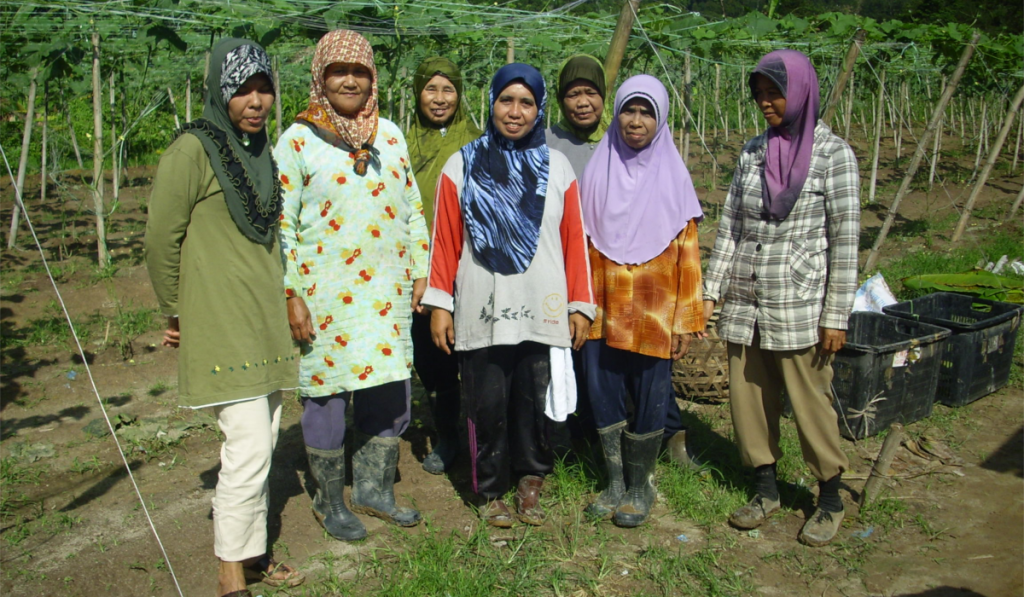
Many single mothers have successfully nurtured children who went on to lead full, normal and happy lives
But it is not all doom and gloom. Many single mothers have successfully nurtured children who went on to lead full, normal and happy lives despite their hardships.
The nine single mothers of the Selama Project are grateful for the opportunity given to them. In rural areas, jobs are few and far between, the pay is low and support is lacking. One mother was candid about her employment on the farm, asking rhetorically, “Where else can I find employment around here?”
The Selama Project prides itself on its new, “green” sustainable agriculture- cum-aquaculture farming model. Neatly tucked away in a valley under the shadow of the Bintang Mountains, the three-hectare farm is an hour’s drive from the historic town of Taiping, in an area famed for its heavy rainfall. To the west, the island of Penang is just 90 minutes by car.
What began as a small conventional farm four years ago has become a chemical-free farm, on which freshwater prawns and eco-friendly Taiwanese tilapia are bred in 26 ponds.
The prawns and fish are free of chemical antibiotics and growth promoters. On nearby fields, eco-friendly fruits and vegetables, such as melon, eggplant, lady’s finger and cucumber are cultivated without the use of chemical additives.
Complementing the farm’s workforce are 10 men, who perform the heavy work of hauling in the nets and providing security. The women feed the baby prawns, and harvest and grade the prawns and fish. On the farms, the women’s duties range from sowing seeds and clearing fields to harvesting crops.
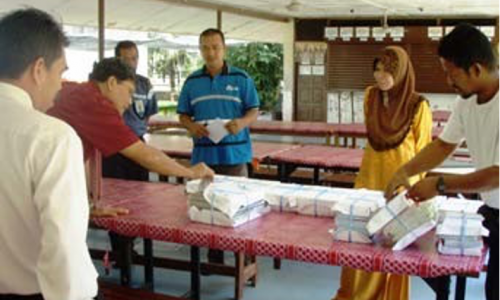
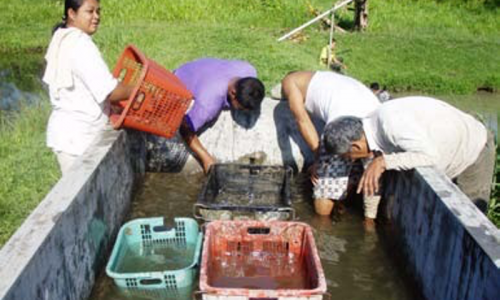
The men and women work together with a spirit of equality
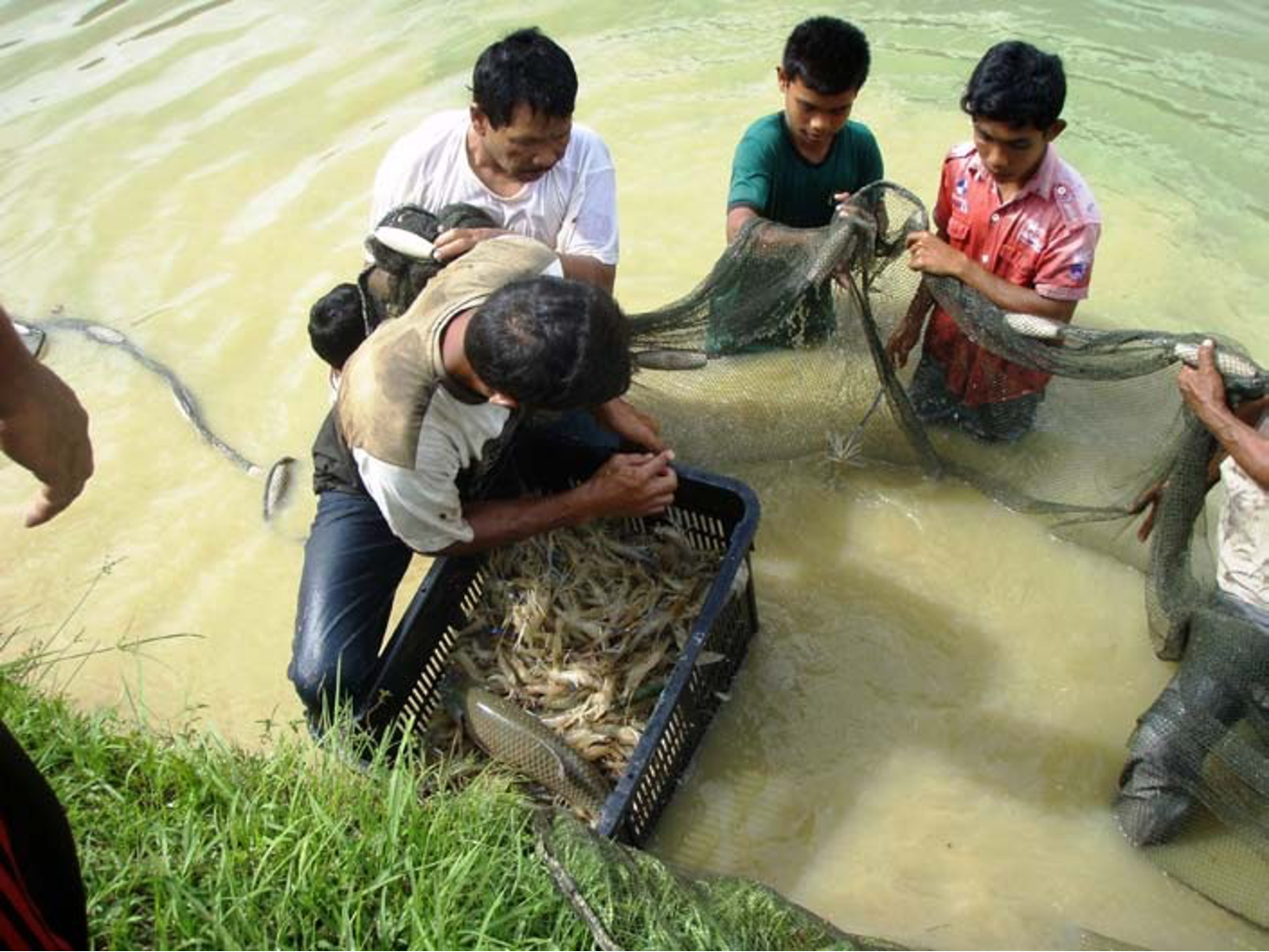
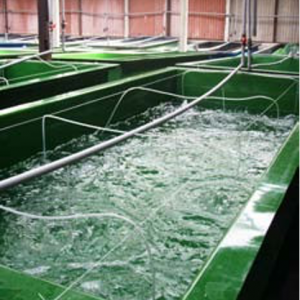
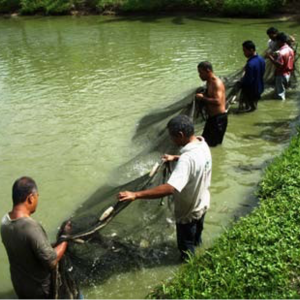
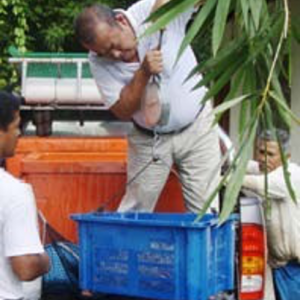
The produce from the green project is sold locally. Demand for the organic freshwater prawns and fish is very high, with buyers supplying restaurants in faraway cities such as Kuala Lumpur.
Awie, a fluids engineer, spent many years working in Japan. On one trip home to visit his family in his hometown of Selama, he was told stories about
his family’s strong historical ties with the area. Convinced that he should reconnect with his roots, he returned and set up the farm to help his community. His decision was made more poignant when he discovered that his grandfather had helped to establish the village of Selama.
Awie lives on the farm and manages it daily. He and Errol are responsible for developing technical strategies, training and community work programmes. They also hope to help disenfranchised youth in the community
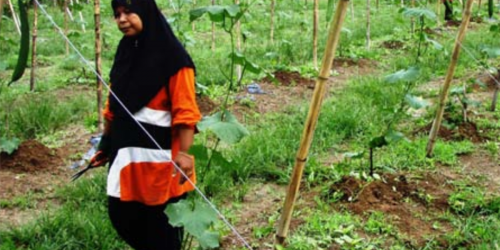
He continues, “The women have a meaningful contribution to make to society. They have job security. Working together means they are supportive of each other and this has helped to combat loneliness and isolation. The flexible working arrangements mean they can share childcare arrangements.”
The men and women work together with a spirit of equality, according to the founders. They see their small company as progressive, pointing to their efforts to involve the community by hiring locals and practising corporate social responsibility.
“Five percent of our proceeds go towards the local co-op which I formed to help local farmers become commercially viable,” says Awie. “We share and provide knowledge, technical expertise, help arrange bulk purchases and devise marketing strategies.
We donate educational materials to local primary schools. We encourage our youth to become interested in farming. We want to rejuvenate the rural areas and stop the rural urban migration.”
The founders are keen to be seen as caring capitalists. They observe that the single mothers work well together and the financial independence has boosted their self-confidence and self-esteem.
“That is why we are always pleased to be amongst them to hear them socialise and laugh and giggle,” explains Awie.
On one hand, the Selama Project is a story about a group of men from diverse backgrounds and different races and religions, starting a sustainable farm to promote their idea of “caring capitalism”. For the single mothers of Selama, the project is one of hope.
